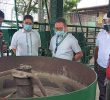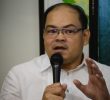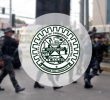But SWS survey says government is not sincere in fighting corruption
By Germelina A. Lacorte
davaotoday.com
DAVAO CITY — The latest Social Weather Stations (SWS) survey of enterprises has given the government a failing mark in its sincerity to curb corruption.
While bribing to win government contracts posted a downtrend among businesses in Davao, Metro Manila, Cebu, and Cagayan de Oro, 14 of the 23 government agencies surveyed last year scored lower this year in their sincerity to fight corruption. The SWS survey was conducted among 700 managers representing 499 companies in seven major cities in the country.
In a videoconference here and in Metro Manila and Cebu last week, Mahar Mangahas, SWS president, said the number of companies in Davao giving bribes to win public-sector contracts declined from 57 percent last year to only 49 per cent this year.
In Manila, the decline was from 57 percent in 2003 to 46 percent this year. In Metro Cebu, the numbers declined from 62 percent in 2004 to 47 percent this year. In Cagayan de Oro, it declined from 65 percent in 2005 to only 38 per cent this year.
This year�s survey was conducted among managers of these companies. It was the sixth of the series of panel-type surveys that the SWS has been conducting since 2000 and had as respondents 700 managers representing 499 companies in Metro Manila, Metro Cebu, Metro Davao, Cagayan de Oro and Iligan and the Cavite-Laguna-Batangas areas.
Most managers said their companies would make profits if corruption were reduced to the level of Singapore, the median of them saying their companies will increase their net income by as much as 20 percent if they can reduce corruption, the SWS survey said.
According to the survey, 10 percent of the projects in the private sector and 15 to 20 percent allowed for bribes.� It also noted a declining solicitation for bribes in certain transactions in the past year and the growing trend among companies in Metro Manila, Cebu and Davao to use honesty in business practices.
Of the respondents, 33 percent said they had been asked for bribes in getting local government permits or licenses and 29 percent for national government permits and licenses. Other transactions where managers said they were asked for bribes included payment for income tax returns, 29 percent of the respondents; importations, 22 per cent of the respondents; supplying government with goods and services, 18 per cent;� collecting receivables from government offices, 16 per cent; and availing themselves of government incentives, 11 per cent.� Only a small percentage of the managers who claimed they were asked for bribe said they reported it as majority deemed the exercise �futile.�
But the same survey poorly rated government agencies in fighting corruption. Businesses within the Cavite-Laguna-Batangas area were the least asked of the seven types of bribes while those in the National Capital Region and Cagayan de Oro were the �most harassed,� according to Mangahas, citing survey results.
Of the 23 agencies surveyed last year, 14 got lower scores this year compared to last year.� From the positive sincerity ratings posted last year, the Department of Justice, the Office of the President and the Presidential Commission on Good Government registered negative marks from the SWS survey this year while the Department of Budget and Management�s rating dropped to zero.� The Office of the Ombudsman�s sincerity rating fell from positive 22 last year to only positive five this year while that of the Department of Interior and Local Governments dipped further from negative 17 rating down to negative 32.
Agencies whose ratings slightly became favorable or less unfavorable than the previous year included the trial courts, the Armed Forces of the Philippines, the Philippine National Police, the Land Transportation Office, the Department of Environment and Natural Resources, the Bureau of Internal Revenue and the Bureau of Customs. While agencies whose ratings remained unchanged from the previous year included the Commission on Audit, the Department of Public Works and Highways (DPWH).
Managers gave local Church leaders the highest rating of �very good� for their sincerity in fighting corruption. The Supreme Court and the Social Security System were rated �good� while the Department of Health, the city and municipal government the Sandiganbayan and the anti-graft court got the rating �moderate.� The trial courts, the COA, the Ombudsman, the Government Service Insurance System, the Department of Education and the Department of Budget and Management (DBM) were classified as mediocre. In the negative categories were the Presidential Commission on Good Government (PCGG), the Office of the President, the Senate, the Presidential Anti-Graft Commission, the AFP, the DOJ, the Department of Transportation and Communications and the Department of Agriculture, which were rated �poor;� the DILG, PNP, LTO, DENR and the House of Representative rated �bad:� and the BIR, the Commission on Elections, DPWH and the Bureau of Customs rated �very bad.�� (Germelina A. Lacorte/davaotoday.com)










